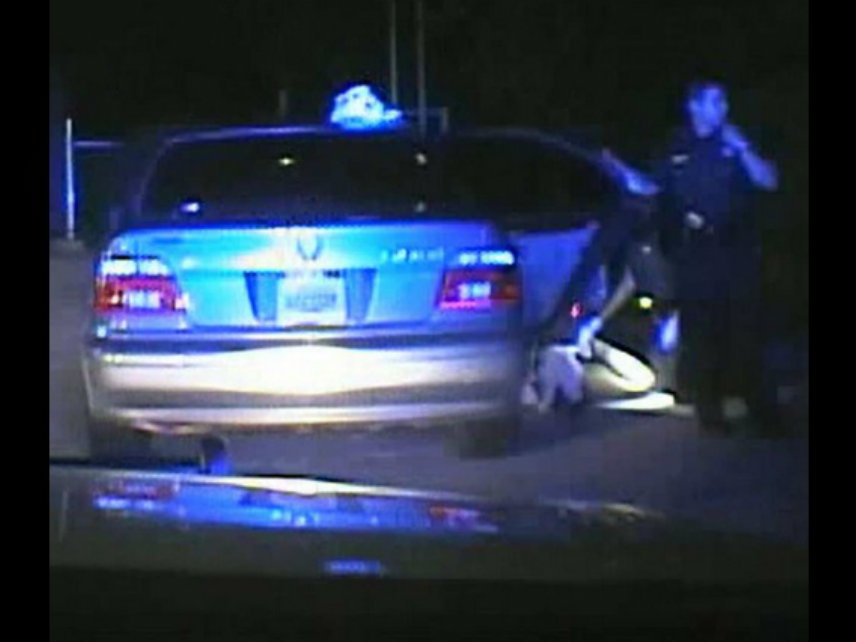Texas Cops Spent 11 Minutes Searching a Woman's Vagina, Found No Drugs
Harris County deputies were initially indicted for the "offensive and shocking" search, but those charges were dropped last week.

Charnesia Corley was a 21-year-old college student with no criminal record when two cops from the Harris County Sheriff's Office stopped her in June 2015 for running a red light.
After searching her car, police claimed to have found .02 ounces of marijuana. That was enough, they apparently felt, to justify a full-body cavity search. When Corley refused to remove her clothes in the dimly lit parking lot where she was being detained, one of the officers threw her to the ground, pushed her partially underneath her own car, and yanked Corley's pants down to her ankles. For the next 11 minutes, dash cam video of the incident shows, she was held down by two officers while being searched. Corley claims that fingers repeatedly probed her vagina and that the officers ignored her protests. A third officer stood nearby holding a flashlight. No drugs were found on Corley's person.
Sam Cammack, an attorney representing Corley in a multi-million-dollar civil rights lawsuit against the county, calls the search "rape by cop."
"It is undoubted that they sexually assaulted her," Cammack says. "They put their fingers inside her vagina. You can't pull someone over, think you might find something, and do that to them."
The full dash-cam video was released to the Houston Chronicle and can be viewed here. It appears to confirm Corley's side of the story, showing officers putting her in handcuffs, tossing her to the ground, removing her pants, and spending several long minutes searching her body.
Two of the officers who conducted the search, William Strong and Ronaldine Pierre, were indicted in June 2016 by a Harris County grand jury on charges of official oppression, but those charges were dropped last week.
"These officers did commit a crime, and now it appears they are not being held accountable for their actions," says Cammack, who wants an independent prosecutor assigned to the case. He says he plans to release dash-cam video of the traffic stop to the media in the hopes of generating enough public outcry to force the county to reopen the case with a new prosecutor.
Corley and Cammack appeared on CNN last night to tell their side of the story to host Don Lemon.
Police initially said Corley consented to the search, but they also charged her with resisting arrest and with possession of marijuana. Harris County prosecutors dropped the charges against Corley in August 2015 and issued a statement calling the search "offensive and shocking."
The Harris County District Attorney's office did not return calls from Reason, but county prosecutor Natasha Sinclair told the Houston TV station KRIV that "no one in this office stands by the search the way it happened," but she also said the officers' "bad judgement" might not rise to the level of criminal offense.
The DA's office told KRIV that it dropped the charges against Strong and Pierre after "new evidence" became available and was presented to a second grand jury, different from the one that voted to indict the officers last year. Because grand jury proceedings are secret, that additional evidence has not been released to the public.
Cammack says he does not believe that a second grand jury has the authority to overrule a grand jury that lawfully charged the two officers.
Cedric Collier, a spokesman for the Harris County Sheriff's Office, confirmed to Reason on Monday that Strong and Pierre are still employed by the department. The two had been placed on administrative duty during the grand jury investigation, Collier said, though he was unsure if their status had changed since the charges were dropped last week. Collier declined to comment on the call for an independent prosecutor, and he said the department is "reviewing our policies and procedures" involving traffic stops and searches.
Whether or not the officers who searched Corley's vagina for more than 10 minutes ever face criminal prosecution, there seems to be little question that the search violated the federal Constitution, state law, and Harris County Sheriff's Office protocol.
A body cavity search without a warrant is a "blatant violation of the Fourth Amendment," Rebecca Robertson, legal and policy director of the Texas ACLU, told the Houston Chronicle in a 2015 article about the incident. Robertson could not imagine a circumstance where a roadside cavity search would be considered constitutional. Protocol for the Harris County Sheriff's Office calls for suspects to be arrested and taken to a substation if a body cavity search must be performed, the Chronicle reported. There a microwave scanner is used for non-intrusive searches.
As if more clarity is needed on the issue, the Texas state legislature in 2015 passed a law specifying that "a peace officer may not conduct a body cavity search of a person during a traffic stop unless the officer first obtains a search warrant pursuant to this chapter authorizing the body cavity search." The bill—passed in response to public outcry over several high-profile incidents of roadside body cavity searches, including one in Harris County where a woman claimed that male troopers laughed while a female officer conducted a body cavity search on her—was signed into law just weeks before the Harris County officers strip-searched Corley.


Show Comments (134)